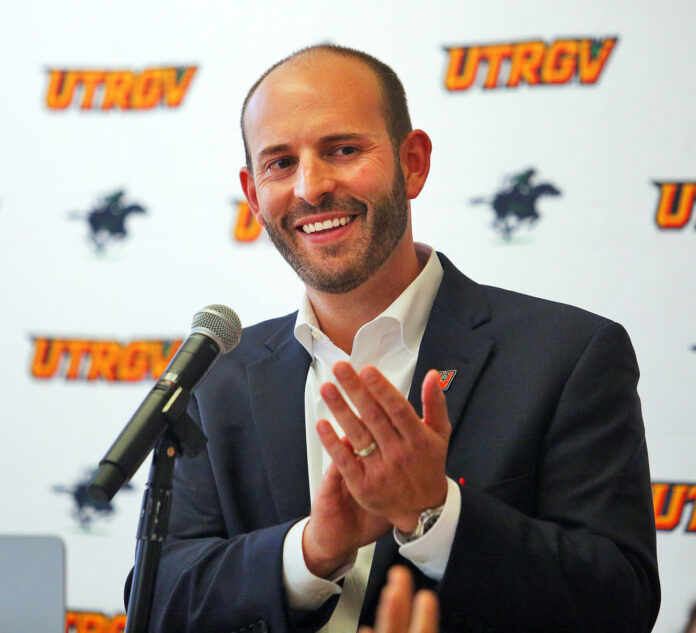
“Sports is something that always pulls us together. I think we can come out of big tragedies, like what’s going on now. I think sports is a big part of our country and I think we realize that.”
Texas A&M football head coach Jimbo Fisher on the Paul Finebaum Show.
Chasse Conque was a high school senior when the devastation of 9/11 occurred.
He remembers the wide-ranging disruption it caused, leaving no person or business untouched.
He also recalls where a lot of the healing began — and expects much of that healing to return the same way once regulations from the COVID-19 virus are eased and the world can return to what can only be described as a new normal.
“Sports have been healing our countries and others for decades,” the UTRGV Vice-President and Director of Athletics said. “It’s what is turned to in a time of need and wanting to feel better. While there’s uncertainty of when we will return to that, athletics will play that role once again and things will turn around quickly.
“We will learn a lot over the next four to six weeks.”
Athletic directors and coaches around the country are planning to make all that happen at the collegiate level, despite heavy hits to athletic budgets and still a crazed sense of the unknown, which seems to morph into different possibilities on an all-too-quickly re-occurrence.
Conque and UTRGV, which are battling tightening budgets while also keeping student athletes at the forefront, have found themselves in as good a position as can be expected during this pandemic time. Many universities have said they are not able to return seniors who missed out on their spring sports season, despite being granted a waiver by the NCAA for another year of eligibility. Other athletic departments have made cuts in salaries and employees.

Meanwhile, UTRGV, which has shown incredible growth in the past 5-7 years, both in enrollment, in their medical school and on the athletic fields, has been able to fend off most of those similar issues. In fact, the university recently offered all senior spring sport athletes the option to return next season and play another year under the same scholarship deal they were awarded during their lost senior athletic season.
The unbudgeted expense, Conque said, would be approximately $330,000.
“We’re very proud to be able to honor out spring sports seniors and their final year of eligibility,” Conque said. “But when you look at our growth and how this institution has responded, every decision has been about the student. The past couple of weeks there have been some very innovative scholarships put into play to serve the university and its students. We’ve created tuition programs and summer relief programs — it makes you proud to see how it’s being handled and, of course, it filters into athletics.”
While the university’s athletic department may be in more solid shape than many others, it doesn’t mean it’s in the clear. Conque said several scenarios have been discussed regarding when the gyms and fields will be able to open again, when athletes will again fill those fields and courts, and what the university will do in the meantime — both for the athletes and in regards to budgets.
“We’re not there yet where we are pursuing cuts at this point,” Conque said. “We are strategically looking at the way we travel, how we travel, the number of competitions on the schedules next year, is there non-essential travel and are there things that we can live without in terms of purchasing. And we will look at some open positions we have and see if they are essential.”
According to the UTRGV Sports Information Department, the athletic department has lost an approximate $430,000 in revenue thus far, $250,000 of that money coming from the NCAA and the loss of the NCAA Basketball Tournament, which earns anywhere between $800 million and $1 billion.
“We will have to recognize this fiscal year, the canceling of the spring season will offset some of that,” Conque said. “But there’s going to be a tightening of the belt. We have a $16 million budget and we will get creative and be ready to experience some short-term pain, but we will come out healthy and make some decisions to do well in the future.”
The hardest thing to face, Conque said, was to plan for the unknown, adding there was a point when COVID-19 started affecting everyday life that things were changing “not every 24 hours, but every couple.”
“When the dust settled a little, we started to look ahead and plan for three or four different scenarios discussing returning for the fall semester, competition, national protocols, when will teams practice, when will we open our gyms and stadiums and preparing both the revenue and expense sides. None are easy topics, you need a best-case and worst-case (scenario).”

Conque said he has been especially grateful for the coaching staff across all sports. He recently met with them via web-conferencing to keep them up to date on the latest plans and where the university stands.
“We talked about the future and what’s happening and the strong position we are in. We all want to get back to normalcy. I’ve been so impressed and grateful for how the coaches are handling all this,” Conque said. “At the end of the day, we are in the business of bringing people together, and right now there’s just so much uncertainty.
“Nobody is built for this or fully prepared for a situation like we are facing, and it certainly has an impact on UTRGV, but because of Dr. Bailey and the leadership and (the)way we are conducting things during this time, we’re in a strong position for what has been heading this way. I’ve spent a lot of time communicating with my colleagues across the country and in the WAC, and we’re all prepared to do business a little differently moving forward.”




